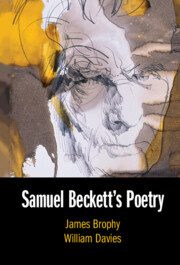Book contents
- Samuel Beckett’s Poetry
- Samuel Beckett’s Poetry
- Copyright page
- Contents
- Notes on Contributors
- Acknowledgements
- Abbreviations
- Introduction
- Chronology of Samuel Beckett’s Poetry
- Chapter 1 Weirdness and Dislocation in Beckett’s Early Poetry
- Chapter 2 Whole Fragments
- Chapter 3 Pre-echoing the Bones
- Chapter 4 ‘The Nucleus of a Living Poetic’
- Chapter 5 Beckett Growing Gnomic
- Chapter 6 Gender, Pronoun and Subject in ‘Poèmes 1937–1939’
- Chapter 7 The Missing Poème
- Chapter 8 Romanticism and Beckett’s Poetry
- 9 Romance under Strain in ‘Cascando’
- Chapter 10 Samuel Beckett’s Self-Translated Poems
- Chapter 11 Samuel Beckett’s Translations of Mexican Poetry
- Chapter 12 Beckett’s Poetry and the Radical Absence of the (War) Dead
- Chapter 13 Beckett’s Sound Sense
- Chapter 14 The Matter of Absence
- Chapter 15 ‘Mocked by a Tissue That May Not Serve’
- Chapter 16 Invoking Beckett
- Index
Chapter 14 - The Matter of Absence
The Manuscripts of Beckett’s Late Poems
Published online by Cambridge University Press: 15 December 2022
- Samuel Beckett’s Poetry
- Samuel Beckett’s Poetry
- Copyright page
- Contents
- Notes on Contributors
- Acknowledgements
- Abbreviations
- Introduction
- Chronology of Samuel Beckett’s Poetry
- Chapter 1 Weirdness and Dislocation in Beckett’s Early Poetry
- Chapter 2 Whole Fragments
- Chapter 3 Pre-echoing the Bones
- Chapter 4 ‘The Nucleus of a Living Poetic’
- Chapter 5 Beckett Growing Gnomic
- Chapter 6 Gender, Pronoun and Subject in ‘Poèmes 1937–1939’
- Chapter 7 The Missing Poème
- Chapter 8 Romanticism and Beckett’s Poetry
- 9 Romance under Strain in ‘Cascando’
- Chapter 10 Samuel Beckett’s Self-Translated Poems
- Chapter 11 Samuel Beckett’s Translations of Mexican Poetry
- Chapter 12 Beckett’s Poetry and the Radical Absence of the (War) Dead
- Chapter 13 Beckett’s Sound Sense
- Chapter 14 The Matter of Absence
- Chapter 15 ‘Mocked by a Tissue That May Not Serve’
- Chapter 16 Invoking Beckett
- Index
Summary
In Beckett’s poem ‘what is the word’, he seems to ask a more fundamental question than in the French original, ‘Comment dire’. Rather than a – crucially unsuccessful – search for ‘le mot juste’, ‘what is the word’ is also a linguistic quest for the ontology of the word.1 What is the word? Is it just a vehicle to bring across a message, or does it have a materiality of its own? Can it be a ‘thing’? And what if this ‘thing’ is crossed out? This essay tries to approach Beckett’s late poetry from a ‘materialist’ perspective in the sense that it takes the materiality of its inscription (ink on paper) as a starting point. It suggests a reading of Beckett’s late poems as he preserved them (in line with the edition of Emily Dickinson’s envelope poems in The Gorgeous Nothings)2; a reading that takes the deliberate ‘scrappiness’ of their drafts into account as an extra dimension and as an integral part of the poetic experience; a reading that helps us refine our notion of presence, find out more about its relation to absence, and perhaps understand how certain forms of absence can also have agency. This materialist perspective does not imply a strictly bibliographical approach, without any relation to the content of these late poems. The profound connection between content and form that Beckett discovered in Joyce’s ‘Work in Progress’ (‘His writing is not about something; it is that something itself’3), became a fundamental characteristic of his own ‘oeuvre in gress’,4 ending in the middle of a sentence (in ‘what is the word’). To the extent that this enactment is a crucial aspect of what H. Porter Abbott has called ‘autography’, I would like to take this autography more literally than Abbott probably intended it: the ‘form’ enacting the ‘content’ of the late poetry also encompasses the autographs (the drafts and notes).
- Type
- Chapter
- Information
- Samuel Beckett's Poetry , pp. 219 - 234Publisher: Cambridge University PressPrint publication year: 2022



